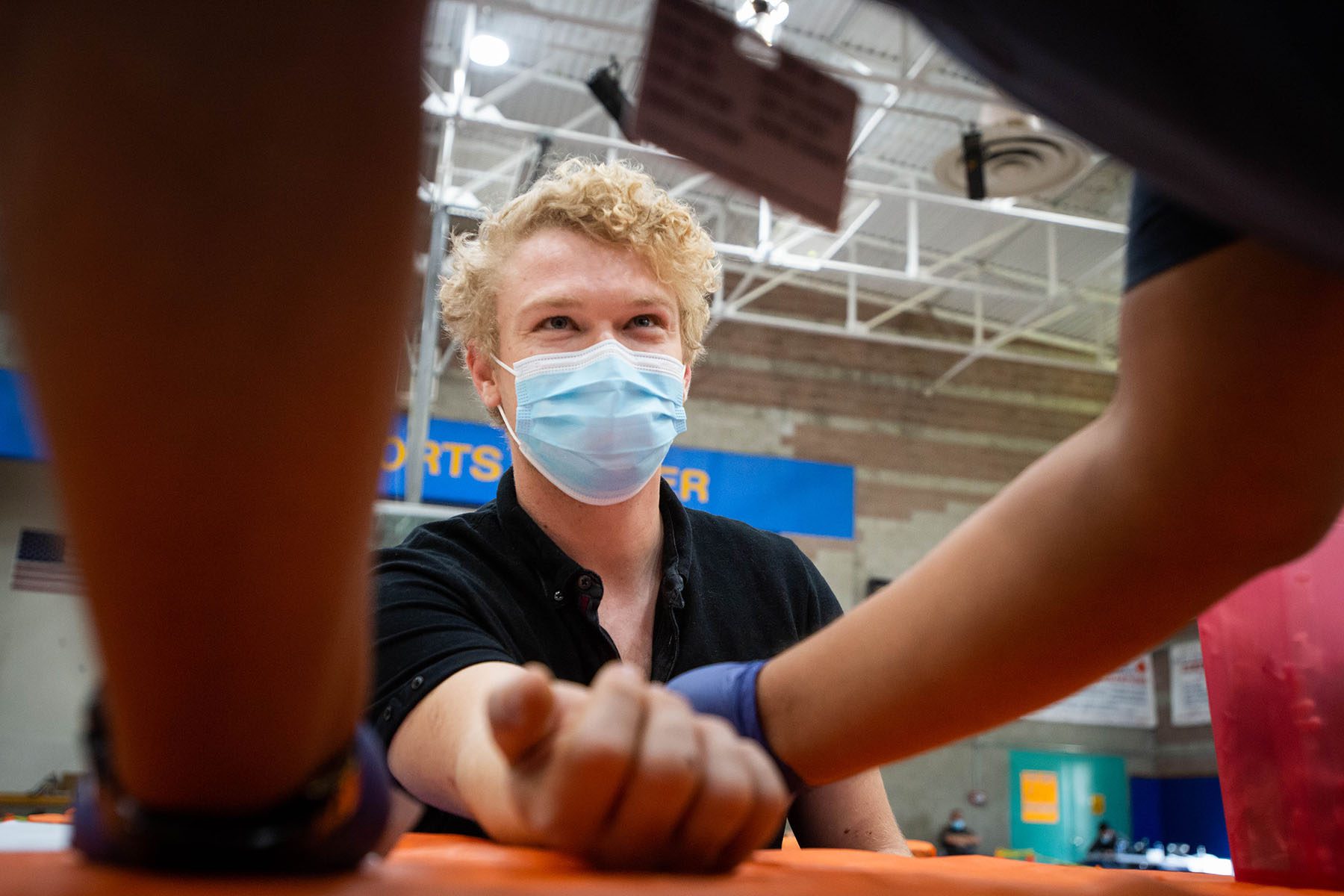When monkeypox cases began to rise over the summer, scientists at the University of California, San Diego, experimented with a way to reduce community spread — surveilling wastewater for the virus just as they have for COVID-19.
“You cannot trace it back to an individual,” said Smruthi Karthikeyan, an environmental engineer and postdoctoral researcher in UC San Diego’s Center for Microbiome Innovation. “We can say if someone’s infected in a building or not, but it doesn’t say Person X is infected. It reduces the stigma, especially for monkeypox; there’s a lot of stigma associated with testing for that. It’s much easier to get that message across, and it doesn’t feel targeted.”
In 2022, nearly 24,000 monkeypox cases have been reported in the United States, with men who have sex with men making up the majority of those infected with the pathogen that belongs to the same family of viruses that causes smallpox. Monkeypox spreads via close contact, and concerns have been raised about the vulnerability of college students since they live in congregate settings — often swapping clothing, sharing beds and having sex with different partners.
It’s unclear how many monkeypox cases there are on college campuses. As students began returning to class last month, White House representatives held meetings with college administrators about containing monkeypox at schools. Multiple universities, including Georgetown, University of Delaware, University of Pittsburgh and San Diego State have reported monkeypox cases. In California, which leads the nation with more than 4,600 monkeypox cases, about 7 percent of infections have occured in the college-age population.
Activists in the LGBTQ+ community say college health officials need to step up their outreach to queer students so these young people have the tools to protect themselves from monkeypox, which produces symptoms such as fever, rash and swollen lymph nodes lasting up to several weeks.
Limiting the spread of monkeypox on college campuses requires a multipronged approach, advocates for LGBTQ+ students say, one that focuses on science and messaging alike.
“There needs to be targeted campaigns and messaging to the communities that are impacted,” said Shane Windmeyer, executive director of Campus Pride, a national nonprofit working toward a safer college environment for LGBTQ+ students. “If this were targeting the general population, we [as a nation] would be doing much more on our college campuses. But the honest truth is that it’s targeting gay and bisexual men and trans women, so we’re doing less than what’s necessary to really have messaging and support [for] these populations as well as all college students.”
The Centers for Disease Control and Prevention (CDC) reports that monkeypox cases have started to flatten, going from an average of 440 cases per day on August 16 to 170 cases per day on September 14. But the outbreak continues to pose risks. This month, Los Angeles County confirmed the nation’s first fatality due to monkeypox; the decedent was severely immunocompromised. In August, a Texan with monkeypox died, but it’s unclear if the virus was directly responsible. Monkeypox has also been found in infants and children, including those who attend K-12 schools.
As monkeypox cases drop nationally, they’re on the rise in communities of color, where vaccination rates are lower than they are in the White population. More than 540,000 vaccine doses, including 11,000 at Pride events, have been administered, but shots have largely gone to White people, according to the CDC. The White House has asked that $4.5 billion in a new government spending bill be used to secure monkeypox vaccines, perform testing and offer treatment, among other interventions.
Due to the federal government’s limited stock of the monkeypox vaccine, higher education institutions may lack their own supply but can partner with local health departments so students can get immunized off campus.

Along with researchers who screen for monkeypox in wastewater , UC San Diego has a small supply of the vaccine to reduce virus spread. Some, but not all, of the nine UC campuses have vaccines in stock.
“College campuses in general lack resources and support when it comes to the populations that are targeted, that being gay [and] bisexual men, trans women, along with other students,” Windmeyer said. “Monkeypox impacts everyone, but I would say they’re largely relying on their health centers that have, sometimes, no relationship with their LGBTQ+ students or very little relationship with their LGBTQ+ students.”
At the University of California, Los Angeles (UCLA), monkeypox outreach has addressed the LGBTQ+ community. With 1,839 cases as of September 16, Los Angeles leads California in monkeypox infections. In the spring, the Gay Sexuality and Social Policy Initiative (GSSPI) at the UCLA Luskin School of Public Affairs launched a campaign to provide accurate information about monkeypox to gay and bisexual men while noting that anyone can contract the virus, to avoid the stigmatizing language used to discuss HIV when it first spread in the 1980s. In partnership with the Los Angeles LGBT Center, GSSPI created an infographic explaining monkeypox transmission, symptoms and interventions. Moreover, Ian Holloway, who leads GSSPI and the Hub for Health Intervention, Policy and Practice at UCLA Luskin, serves on the scientific advisory committee to the California Department of Public Health. He has emphasized that monkeypox outreach to men who have sex with men should be equitable, with a focus on queer men of color.
Jorge Reyes Salinas, a spokesperson for Equality California, a statewide LGBTQ+ civil rights organization, said many colleges have websites covering the basics of monkeypox — and little else. He’s disappointed that some institutions have minimized the risk of contracting the virus. The risk appears to be relative. According to an NPR analysis, women and heterosexual men had a 1 in 260,000 chance of developing monkeypox in August, while men who have sex with men had a 1 in 750 chance.
In San Diego’s wastewater, the amount of monkeypox has declined. “It was steadily increasing,” Karthikeyan said. “Now it’s sort of plateauing.”
Monitoring monkeypox in the wastewater can be particularly beneficial when communities don’t have the resources to conduct mass testing. “Our wastewater with [COVID-19] started that way because there just weren’t enough tests in certain counties,” Karthikeyan said.
While Salinas supports scientific interventions to contain monkeypox, he is especially interested in messaging and outreach. Ideally, he would like higher education institutions to partner with Pride or LGBTQ+ centers to educate students about monkeypox. In more rural parts of the state, where it may be difficult for vulnerable students to get immunized off campus without driving long distances, he would like colleges to organize pop-up vaccine clinics. But California State University (CSU), the nation’s largest university system with 23 campuses, does not have its own supply of monkeypox vaccine, according to spokesperson Toni Molle.
“CSU campuses are being advised to work with state and local health authorities about vaccine availability, eligibility and locations,” Molle told The 19th.
In the meantime, it is monitoring guidance from the California Department of Public Health and the CDC and sharing information with the CSU community about how monkeypox is transmitted and how to prevent infection.
“As more vaccine becomes available, campuses may be able to receive their own supply,” she said. In addition, the UC Office of the President has shared guidance with UC campuses about monkeypox that includes teaching campus health providers to recognize the signs and symptoms of monkeypox, and educating students and staff about the virus, its transmission and vaccination protocols, along with safer sex practices and risk factors. The guidance did not mention specific outreach to LGBTQ+ students.
Windmeyer said that it’s also important for colleges and universities to raise monkeypox awareness on the social media platforms students frequent, such as TikTok, Snapchat and Instagram. UC San Diego’s Student Health and Well-Being center posted a monkeypox primer on Instagram over the summer.
Beyond California, the University Health Services at the University of Texas at Austin has a webpage that breaks down the basics of monkeypox. It mentions stigma, stating that members of stigmatized communities may decline to get help when needed and members of non-stigmatized communities may forgo preventative measures because of presumed invulnerability to infection. Students who suspect they’ve contracted monkeypox can call a nurse advice line for guidance and testing services.
In a statement to The 19th, UT Austin spokesperson Shilpa Bakre said that the “university has mitigation protocols in place for communicable disease” and that “the risk to the broader campus community remains low.” To contain monkeypox, the university is providing public health education to the community, training health care providers and collaborating with key stakeholders on strategies to reduce the spread of monkeypox. She had no further comment when asked if UT Austin is conducting particular outreach to LGBTQ+ students.
At Georgetown University, which reported a presumptive monkeypox infection in June, the Public Health team is collaborating with the Student Health Center (SHC) and the Infectious Diseases Department at MedStar Georgetown University Hospital to manage suspected and confirmed monkeypox cases, according to a spokesperson. “The SHC is able to carry out the specific testing required to reach a diagnosis,” the spokesperson added. “We are also collaborating with the DC Department of Health.”
As some schools attempt to destigmatize monkeypox and educate students about the virus, others may largely ignore the virus’ existence or the students most vulnerable to it. This is the case at the nation’s religious colleges that openly discriminate against LGBTQ+ students, Windmeyer said. At those institutions, students may hesitate to ask officials for help in acquiring monkeypox immunizations or tests, let alone come forward with symptoms, because it may raise questions about their sexual orientation.
The colleges and universities most likely to manage monkeypox best are those with a proven track record of working with LGBTQ+ students, Windmeyer said.
“They are in the best position to do a really great job with messaging and to make sure that we have prevention measures such as ensuring that the vaccines reach those students that are the most impacted and that vaccines are readily available and at events, much like right now in several communities, you can get a monkeypox vaccination at a Pride festival,” Windmeyer said. “That should happen on college campuses too when it comes to prevention. It’s really about awareness and knowledge and vaccinations at this point.”








